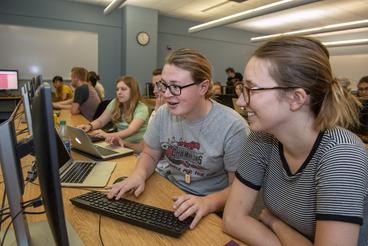Class Participation
Start with a class in which you feel comfortable

Make your first efforts to participate in a class that feels comfortable. Perhaps you will choose a class with fewer students; or a class being taught by an instructor who seems particularly supportive; or a class where you sit beside a good friend.
Be prepared for class
The people who feel most comfortable speaking in class are often the ones who have done the assigned readings and have thought about the topic in advance. Before class, read, write, think and talk to others. If it helps, write your questions and ideas down on a piece of paper and refer to it in class. By using these strategies, you will feel more confident that you understand the material and you will therefore be more prepared to talk about it.
Sit in front of the class
If looking out over a sea of faces makes you uncomfortable, try sitting in the front of the classroom. Then, when you speak, imagine you are simply talking to the instructor and a few students.
Set small, reasonable goals for participating more
If frequent participation is expected in a class, start by promising yourself that you will say one thing, an answer or a question, in each class. Once this feels comfortable, increase the amount that you participate.
Say something at the first opportunity
Ask a question or answer a question, no matter how simple it may seem. Participating gets easier with practice. Conversely, it often gets hard to say something the longer you wait.
Get to know the students in your class

If you have talked with fellow students in an informal setting, you will probably feel more comfortable talking in front of them in the classroom. Try asking someone a question before or after class. You could also consider suggesting a study group, or getting together to compare class notes.
Assume people are supportive
Before speaking, imagine that everyone in the room is rooting for you. Focus on the people who seem friendly. If there are students who are not very supportive of your efforts, ignore them.
Ask the instructor for help
If you would like to participate more but do not know how to get started, talk to your instructor for ideas on how to improve class participation.
Disagreement does not have to be threatening
If others disagree with you in class, this does not necessarily mean that you are wrong. It does not necessarily mean that they are wrong either. Quite often multiple points of view are discussed in class and each point of view has merit. Even when people express themselves very strongly, they often do not mean to intimidate you; they simply want to present their own ideas firmly. Although it may sometimes feel difficult, try to think of ‘disagreements’ as a healthy component of discussion and recognize that this exchange of ideas and points of view encourages learning.
Separate yourself from your answer
If you do happen to give the wrong answer to a question, try not to blame yourself. Just because your answer was incorrect, does not mean you are a “bad” or “stupid” person. It just means you did not get the right answer. It may also help your instructor to understand which information might need additional clarification.